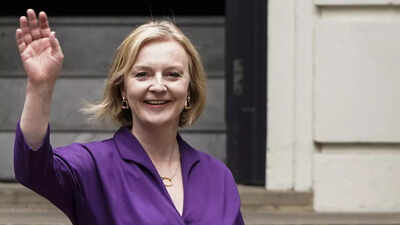Top Searches
- News
- World News
- UK News
- Ideological dexterity or opportunism? The many contradictions of Liz Truss's political life
Ideological dexterity or opportunism? The many contradictions of Liz Truss's political life

NEW DELHI: Liz Truss is all set to take charge as Britain's new Prime Minister, the third woman to hold the post after Margaret Thatcher and Theresa May.
By defeating Rishi Sunak in a long battle to 10 Downing Street, Truss has completed a political odyssey from rabble-rousing republican to tradition-cloaked leader of the Conservative Party.
A self-styled “disruptor-in-chief”, Truss has often been called out by critics for flip-flopping on a range of policies — from Brexit to abolishing the monarchy.
Supporters interpret Truss's U-turns as "ideological dexterity", saying that the Conservative leader can adapt her approach if needed. But her critics call it "political opportunism".
Notably, only one in seven Britons say that Truss will be a better Prime Minister than Boris Johnson, according to a snap poll by YouGov on Monday. A quarter of people feel she will be worse.
This is, in part, due to Truss's shifting stands over the years.
Here's why Truss is known for her contradictions ...
* Anti-monarchy stance: As student at Oxford in 1994, 19-year-old Truss had called for a referendum to abolish the British monarchy. She told an audience of fellow Liberal Democrats, “We do not believe that people should be born to rule.” But later, Truss pivoted to embrace the monarchy as being good for British democracy. Now, she is set to be anointed by the Queen at her Balmoral Castle residence in Aberdeenshire.
* Left-wing Liberal Democrat to torchbearer of Conservative right: As a child, Truss was taken along to protests against Margaret Thatcher’s 1980s Conservative government. Truss later became president of the Oxford University Liberal Democrats, where she campaigned to legalize marijuana. Soon after graduating in 1996, Truss switched to the Conservative, becoming the champion of the right.
* Europphile to Brexiteer: Truss had campaigned strongly for Britain to remain in the European Union but later embraced Brexit when the vote went the other way. In fact, she became one of Brexit's most ardent evangelists.

*Low taxes or handouts? Truss has said in the past that she favoured tax cuts over "handouts". But signs point to a Truss U-turn on the handouts as she begins her journey as PM amid rising energy bills. After saying she will not be giving people "handouts" to help with soaring energy bills, her supporters said she "hasn't ruled out all future help."
* U-turn on wage cut: Recently, Truss was forced into a sharp U-turn on a key policy proposal which would have cut public sector wages outside of London. Truss had said she plans to introduce regional pay boards instead of national ones to set salaries for civil servants. However, after widespread criticism, Truss said her policy had been "misrepresented" and the “current levels of public sector pay will absolutely be maintained”.
* Protecting steel industry: As trade secretary, Truss backed away from plans to impose a major reduction in trade barriers. She initially wanted to drop tariffs on a specific type of imported steel. But after the UK steel industry protested, she dropped the proposal.
By defeating Rishi Sunak in a long battle to 10 Downing Street, Truss has completed a political odyssey from rabble-rousing republican to tradition-cloaked leader of the Conservative Party.
A self-styled “disruptor-in-chief”, Truss has often been called out by critics for flip-flopping on a range of policies — from Brexit to abolishing the monarchy.
Supporters interpret Truss's U-turns as "ideological dexterity", saying that the Conservative leader can adapt her approach if needed. But her critics call it "political opportunism".
Notably, only one in seven Britons say that Truss will be a better Prime Minister than Boris Johnson, according to a snap poll by YouGov on Monday. A quarter of people feel she will be worse.
This is, in part, due to Truss's shifting stands over the years.
Here's why Truss is known for her contradictions ...
* Anti-monarchy stance: As student at Oxford in 1994, 19-year-old Truss had called for a referendum to abolish the British monarchy. She told an audience of fellow Liberal Democrats, “We do not believe that people should be born to rule.” But later, Truss pivoted to embrace the monarchy as being good for British democracy. Now, she is set to be anointed by the Queen at her Balmoral Castle residence in Aberdeenshire.
* Left-wing Liberal Democrat to torchbearer of Conservative right: As a child, Truss was taken along to protests against Margaret Thatcher’s 1980s Conservative government. Truss later became president of the Oxford University Liberal Democrats, where she campaigned to legalize marijuana. Soon after graduating in 1996, Truss switched to the Conservative, becoming the champion of the right.
* Europphile to Brexiteer: Truss had campaigned strongly for Britain to remain in the European Union but later embraced Brexit when the vote went the other way. In fact, she became one of Brexit's most ardent evangelists.

*Low taxes or handouts? Truss has said in the past that she favoured tax cuts over "handouts". But signs point to a Truss U-turn on the handouts as she begins her journey as PM amid rising energy bills. After saying she will not be giving people "handouts" to help with soaring energy bills, her supporters said she "hasn't ruled out all future help."
* U-turn on wage cut: Recently, Truss was forced into a sharp U-turn on a key policy proposal which would have cut public sector wages outside of London. Truss had said she plans to introduce regional pay boards instead of national ones to set salaries for civil servants. However, after widespread criticism, Truss said her policy had been "misrepresented" and the “current levels of public sector pay will absolutely be maintained”.
* Protecting steel industry: As trade secretary, Truss backed away from plans to impose a major reduction in trade barriers. She initially wanted to drop tariffs on a specific type of imported steel. But after the UK steel industry protested, she dropped the proposal.
FOLLOW US ON SOCIAL MEDIA
FacebookTwitterInstagramKOO APPYOUTUBE
Start a Conversation
end of article









